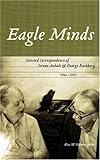 Eagle Minds: Selected Correspondence of Istvan Anhalt and George Rochberg by Alan M. Gillmor
Eagle Minds: Selected Correspondence of Istvan Anhalt and George Rochberg by Alan M. Gillmorrating: 4 of 5 stars
The title of this compendium of letters comes from Yeats, who wrote: "...A mind Michael Angelo knew/That can pierce the clouds,/Or inspired by frenzy/Shake the dead in their shrouds;/Forgotten else by mankind,/An old man's eagle mind." In offering this quote to Canadian composer Istvan Anhalt, George Rochberg expressed his relationship to the world and the critical reception of his work. Although their music differed greatly in style, particularly after 1965, these two composers found over forty years worth of common bonds, intellectual musings, and a committed passion for their craft which are all recorded in Alan Gillmor's excellent compendium of correspondence.
Rochberg worked hard to understand Anhalt's aesthetic, and the latter likewise supported Rochberg's various stylistic experiments. Fundamentally, however, they understood what it meant to compose. They also shared a critical engagement with the world, although Anhalt focused on Kabbalah studies and a distrust of popular culture, while Rochberg found solace in the words of Wordsworth, Yeats,and Milan Kundera and eschewed all forms of organized religion.
Rochberg, who died in 2005, has long been known for his strident opposition to the avant-garde (after 1964), both in his musical style and his public writings. While his letters to Anhalt do not negate this, they do give the reader a sense that there was a willingness to accept more than his published writings would suggest. He also felt misunderstood as the "neo-Romantic" label came to be applied to his music.
Anhalt, whose gentler prose provides a balm to Rochberg's occasional bouts of ranting, seems to be more conscious that the two men are moving toward the end, and thus feels more inclined to pick his battles carefully. His study of the Kabbalah helped develop a personal philosophy that came to fruition is his 1994 work, Traces/Tikkun.
These letters provide a rich look into the perceptive and engaging minds of two of North America's most intellectual thinkers. The book is an indispensable tool for research into their works and biography, and is an encouragement to other modern composers to make their correspondence available for publication.
No comments:
Post a Comment